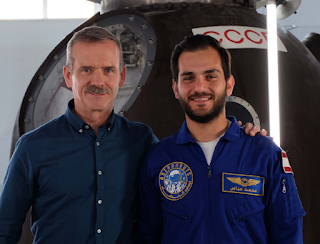What are some possible careers in astronomy?
Do you find the study of stars, moons, planets, and comets to be interesting? If so, an Astronomy career would be the best fit for you. Astronomy is the study of celestial objects such as the sun, moon, stars, planets, comets, space, and other extraterrestrial objects.
Dr. Mohamad Abbas, a Science Communicator, states that there is a great
scope in astronomy as a career. Let’s know what Astronomy is exactly. The
area of physics known as astronomy is concerned with the study of celestial
objects such as planets, stars, and galaxies. It is the study of the physical
and chemical characteristics of objects that are not part of the earth's
atmosphere.
Astronomers
are researchers who study the planets in our solar system to learn more about
"how the universe works." It contains a study on the development of
stars. Astronomers use mathematical and physical principles to study the
universe. They collect information about the properties of planets, moons,
stars, and other objects using telescopes and computer programs. Here are some
well-paying jobs in astronomy that offer a variety of work settings:
Senior technical writer:
Expert-level
expertise in a particular field is crucial for a successful career in technical
writing. Technical writers can choose to work as professionals with astronomy
degrees. They work with research scientists to write peer reviews and critiques
that direct the field's research in addition to writing research and grant
proposals. Technical writing is therefore a popular career path in astronomy,
and senior-level writers are typically those with deep scientific backgrounds.
College Professor:
Astronomy
graduates may opt to work in an academic setting since they are qualified to
teach at the college level. These college professors may instruct a range of
astronomy and physics-related courses, including biophysics, cosmology,
observational astronomy, and physics education research, depending on their
research specialties. They frequently play the additional role of department
chair. They use university resources and research facilities to create high-impact
research programs in addition to teaching.
Research Scientist:
Research
scientists are technical experts who work in a variety of astronomy subfields.
They are also critical thinkers. They carry out research for organizations and
labs to achieve a significant common goal. Scientific research environments can
be both independent and collaborative. When research scientists are prepared,
they present their findings in peer-reviewed articles in trade publications as
well as at scientific meetings.
Planetarium director
Astronomy graduates who are born leaders will excel in their roles as planetarium
or planetary museum directors. In this field, museum directors—also referred to
as curators—have a love of science and frequently have close ties to people in
the aerospace industry. Directors typically have illustrious scientific careers
in which they direct the mission of the museum using their in-depth industry
knowledge and research prowess. They manage and oversee museum exhibits, and
they might collaborate with other staff members to safeguard the museum's artifacts.
Meteorologist:
A
meteorologist, who studies the Earth's atmosphere to predict weather patterns,
works in astronomy. They have received specialized training in producing their
findings using mathematical and physical formulations. A meteorologist's
primary responsibilities include gathering, analyzing, and interpreting data
from satellites, global weather stations, and other instruments. Governmental organizations,
the private sector, and media companies receive the findings from their
research and use them to inform their decisions.
Climatologist:
The
focus of climatology careers is on regional long-term weather patterns. A
climatologist is a problem-solver who studies the variables that affect the
weather over many decades, frequently based on a 30-year cycle. They can be
seen gathering soil samples, performing data analysis, and presenting their
findings to the neighborhood. A climatologist might create new measurement
tools or forecast the weather.
Science Communicator:



Comments
Post a Comment